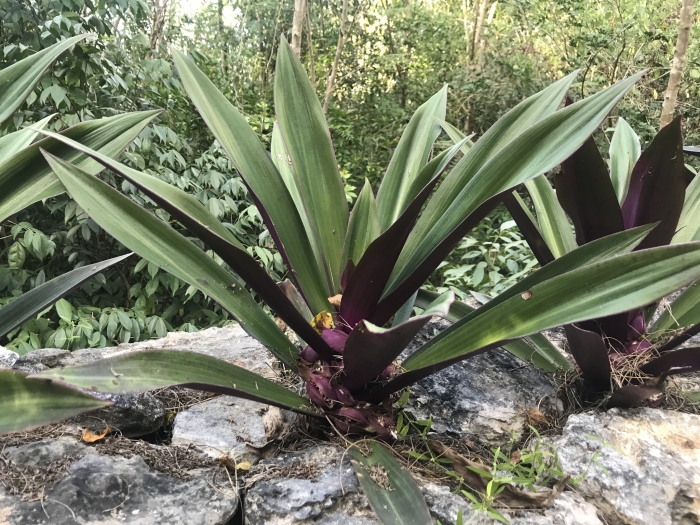Boatlily
(Tradescantia spathacea)
Boatlily (Tradescantia spathacea)
/
/

davidroy
Public Domain
Image By:
davidroy
Recorded By:
Copyright:
Public Domain
Copyright Notice:
Photo by: davidroy | License Type: Public Domain | License URL: http://creativecommons.org/publicdomain/zero/1.0/ | Rights Holder: davidroy | Publisher: iNaturalist | Date Created: 2020-02-07T21:11:44Z |


















































Estimated Native Range
Summary
Tradescantia spathacea, commonly known as Boatlily or Moses-in-the-Cradle, is an evergreen perennial herb native to understory tropical forests and grasslands in Mexico and Central America. It typically forms dense clumps reaching up to 0.30 m (1 ft) in height and width. The plant features fleshy rhizomes and rosettes of waxy, lance-shaped leaves that are dark to metallic green on the upper surface and glossy purple underneath, creating a striking contrast. Boatlily is known for its foliage rather than its flowers, which are small, white, and blue, appearing in the spring and winter. The flowers are somewhat inconspicuous, nestled within the leaf axils.
Boatlily is valued for its vibrant foliage, which adds a tropical flair to indoor and outdoor settings. It is hardy in USDA zones 9-12 and is popular as an ornamental houseplant or in shaded outdoor gardens where temperatures permit. The ’Sitara’ cultivar, awarded the Royal Horticultural Society’s Award of Garden Merit, is particularly noted for its attractive foliage. Boatlily requires medium amounts of water and thrives in well-draining soils with full sun to part shade exposure. While generally easy to maintain, it can suffer from root rot if overwatered. Tradescantia spathacea can be extremely invasive outside its native range, posing a threat to native ecosystems in regions such as the Caribbean, Guatemala, Japan, Kenya, and the United States. Gardeners should exercise caution and consult local regulations before planting it in non-native areas.CC BY-SA 4.0
Boatlily is valued for its vibrant foliage, which adds a tropical flair to indoor and outdoor settings. It is hardy in USDA zones 9-12 and is popular as an ornamental houseplant or in shaded outdoor gardens where temperatures permit. The ’Sitara’ cultivar, awarded the Royal Horticultural Society’s Award of Garden Merit, is particularly noted for its attractive foliage. Boatlily requires medium amounts of water and thrives in well-draining soils with full sun to part shade exposure. While generally easy to maintain, it can suffer from root rot if overwatered. Tradescantia spathacea can be extremely invasive outside its native range, posing a threat to native ecosystems in regions such as the Caribbean, Guatemala, Japan, Kenya, and the United States. Gardeners should exercise caution and consult local regulations before planting it in non-native areas.CC BY-SA 4.0
Plant Description
- Plant Type: Herb
- Height: 0.5-1 feet
- Width: 1-2 feet
- Growth Rate: Moderate
- Flower Color: White
- Flowering Season: Spring, Winter
- Leaf Retention: Evergreen
Growth Requirements
- Sun: Full Sun, Part Shade
- Water: Medium
- Drainage: Medium, Fast
Common Uses
Bee Garden, Bird Garden, Butterfly Garden, Drought Tolerant, Groundcover, Hummingbird Garden, Low Maintenance, Potted Plant, Salt Tolerant, Street Planting
Natural Habitat
Understory tropical forests and grasslands
Other Names
Common Names: Moses-In-The-Cradle, Oysterplant, Boat-Lily, Oyster Plant, Purpurblättrige Dreimasterblume, Blomstervagga, Moses-In-A-Basket, Boat Lily, Boat Plant, Faina Kula
Scientific Names: , Tradescantia spathacea, Rhoeo spathacea, Rhoeo discolor, Ephemerum bicolor, Ephemerum discolor, Rhoeo spathacea f. concolor, Rhoeo spathacea f. spathacea, Rhoeo spathacea f. variegata, Rhoeo spathacea subsp. concolor
GBIF Accepted Name: Tradescantia spathacea Sw.